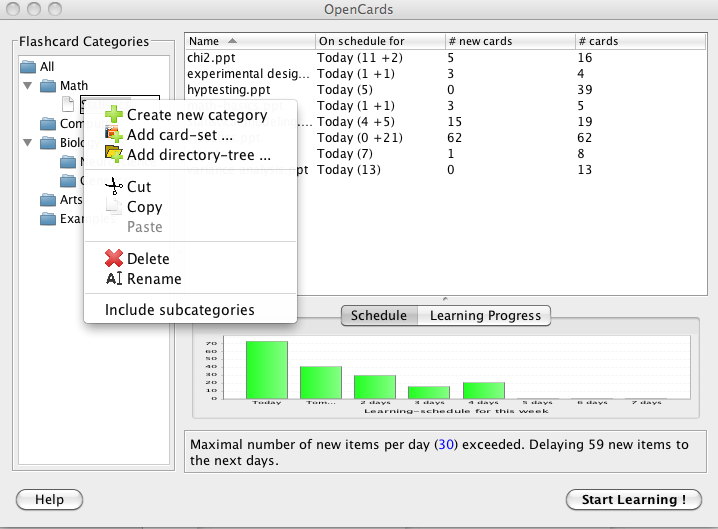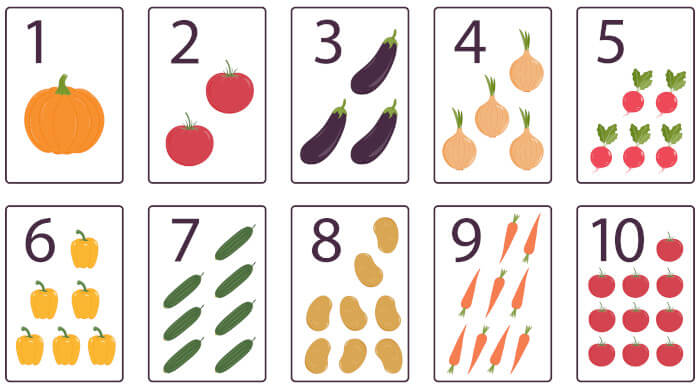OpenCards is a free award-winning flashcard learning software. The basic idea of OpenCards is to use PowerPoint presentations (*.ppt) or Markdown (*.md) files as flashcard sets.
Thereby, slide-titles are represented as questions and the slide contents as their answers.
Based on state-of-the-art memorization and scheduling algorithms OpenCards will help you to learn any set of flashcards.
Features include:
- Implements two different learning models:
- A box-based short-term learning procedure, called last-minute learning.
- More sophisticated long-term memorization model based on the principles of active recall and the forgetting model. The latter is implemented as an improved version of the SuperMemo2 algorithm. The SM2 algorithm had been created for SuperMemo in the late 1980s, but still forms the basis of many spaced repetition software applications. OpenCards’s implementation of the algorithm is modified to allow priorities on cards, and to show cards in order of their urgency.
- Flexible flashcard design (vocalization, fast image copy, HTML copy & paste, and Asian language support).
- Support for markdown files as flashcard sets with the following advantages:
- Plain text format which can be version controlled with git.
- Better editing power.
- Allows users to mix documentation with questions and answers. OpenCards will by default just consider section that end with a “?” as flashcards. This can be changed in the preferences (->Advanced).
- Better support for equations (e.g. using MathJax).
- Easier programmatic creation of flashcard sets from content.
- Faster because it works without reading the tough binary .ppt format.
- More web-friendly since markdown can be converted to HTML within the browser.
- Well supported flashcard-file format.
- Good community support.
- Abundant free card-files available from the internet.
Website: opencards.info
Support: FAQ, Forum, GitHub Code Repository
Developer: Holger Brandl and contributors
License: GNU General Public License version 3.0

OpenCards is written in Java. Learn Java with our recommended free books and free tutorials.
| Popular series | |
|---|---|
| The largest compilation of the best free and open source software in the universe. Each article is supplied with a legendary ratings chart helping you to make informed decisions. | |
| Hundreds of in-depth reviews offering our unbiased and expert opinion on software. We offer helpful and impartial information. | |
| The Big List of Active Linux Distros is a large compilation of actively developed Linux distributions. | |
| Replace proprietary software with open source alternatives: Google, Microsoft, Apple, Adobe, IBM, Autodesk, Oracle, Atlassian, Corel, Cisco, Intuit, SAS, Progress, Salesforce, and Citrix | |
| Awesome Free Linux Games Tools showcases a series of tools that making gaming on Linux a more pleasurable experience. This is a new series. | |
| Machine Learning explores practical applications of machine learning and deep learning from a Linux perspective. We've written reviews of more than 40 self-hosted apps. All are free and open source. | |
| New to Linux? Read our Linux for Starters series. We start right at the basics and teach you everything you need to know to get started with Linux. | |
| Alternatives to popular CLI tools showcases essential tools that are modern replacements for core Linux utilities. | |
| Essential Linux system tools focuses on small, indispensable utilities, useful for system administrators as well as regular users. | |
| Linux utilities to maximise your productivity. Small, indispensable tools, useful for anyone running a Linux machine. | |
| Surveys popular streaming services from a Linux perspective: Amazon Music Unlimited, Myuzi, Spotify, Deezer, Tidal. | |
| Saving Money with Linux looks at how you can reduce your energy bills running Linux. | |
| Home computers became commonplace in the 1980s. Emulate home computers including the Commodore 64, Amiga, Atari ST, ZX81, Amstrad CPC, and ZX Spectrum. | |
| Now and Then examines how promising open source software fared over the years. It can be a bumpy ride. | |
| Linux at Home looks at a range of home activities where Linux can play its part, making the most of our time at home, keeping active and engaged. | |
| Linux Candy reveals the lighter side of Linux. Have some fun and escape from the daily drudgery. | |
| Getting Started with Docker helps you master Docker, a set of platform as a service products that delivers software in packages called containers. | |
| Best Free Android Apps. We showcase free Android apps that are definitely worth downloading. There's a strict eligibility criteria for inclusion in this series. | |
| These best free books accelerate your learning of every programming language. Learn a new language today! | |
| These free tutorials offer the perfect tonic to our free programming books series. | |
| Linux Around The World showcases usergroups that are relevant to Linux enthusiasts. Great ways to meet up with fellow enthusiasts. | |
| Stars and Stripes is an occasional series looking at the impact of Linux in the USA. | |
